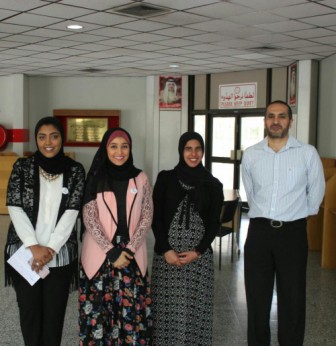UoB students treat Aluminium alloy to enhance its properties
Three Chemical Engineering students from University of Bahrain managed to advance their steps towards conditioning and figuring out the Aluminium Alloy. Maram Al Aradi, Sarah Al Shamlan and Noor Bucheeri’s senior project was centred on ‘Enhanced Mechanical and Electro-Chemical Properties through Interrupting Ordinary Heat Treatment with Low Temperature Cycles for Aluminium Alloy” supervised by Dr. Oday Al Buhamad and Dr. Hosni Zubeir who specializes in corrosion testing.
They were inspired to push this project towards benefitting the country on an industrial level. Their project entailed subjecting Aluminium Alloy 6061 to a series of heating at different temperatures followed by rapid cooling by water in order to manipulate the microstructure to produce and enhance desirable properties such as maximum tensile strength, yield, hardness, fracture toughness, electrical conductivity and corrosion resistance. Four different heat treatment cycles were performed; each contained 24 aluminium alloy 6061 samples with two different diameters.
Speaking to one of the students, Maram Al Aradi, she explained that, “This project was chosen because our kingdom’s economy depends on producing and exporting aluminium and aluminuim alloys from Alba and Midal Cables respectively. In addition, aluminium alloys are widely used in several applications such as electricity cables, bridges and several vehicles’ structure like motorbikes, bicycle frameworks and ships. Therefore, improving the performance of these alloys in these fields will serve great benefits for customers and the industry. We have selected this project in particular as this idea is not very common in the gulf countries and any slight improvements might be a breakthrough in this field. On top of that, we wanted to challenge ourselves, our limits and creative thinking as this type of study and investigation were quite different from what was being taught in the university.”
Since the properties of the aluminium alloys have been enhanced, the performance of the applications will be enhanced as well. The resulting alloys from the heat treatment subjected to them have become stronger and their fracture resistance has increased including their resistance to corrosion. Hence, cables, frameworks and bridges are more reliable and sustainable.
Sarah Al Shamlan explained the challenges they faced as a group on the project, as she said, “The biggest challenge of the project was finding the space and means to perform the heat treatment cycle. Usually, aluminium alloys are produced in large quantities and the heat treatment should be conducted in a large oven with sufficient heating capacity.”
Several articles from scientific journals were used as a reference along with university student batches who attempted to investigate the importance of the interrupted heat cycle.
In which Noor Bucheeri added that, “Unlike the previous batch of students, our results have shown significant improvements in terms of tensile strength, hardness and corrosion resistance with a reasonable trade off in the yield.”
It is confirmed that the project has several future plans either by further investigation of the best cycle that was obtained in the project by advanced means and tools.
All the three girls have stated that, "We have received great credit on our performance and results in the project and this field in particular as it is not that well established and studied in the gulf countries. Therefore, it is said that our work will become a very important platform for future developments. We hope our work helps researches who are seeking the betterment of aluminium alloys."
Related Posts

